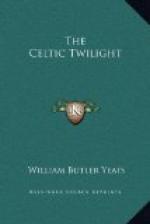When the story got to this, the farmer’s daughter joined In mockingly with, “I suppose you said that for Byrne’s good, father.” But the old man insisted that he had said it for Byrne’s good; and went on to tell how, when he got a letter telling of Byrne’s engagement to the girl, he wrote him the same advice. Years passed by, and he heard nothing; and though he was now married, he could not keep from wondering what she was doing. At last he went to America to find out, and though he asked many people for tidings, he could get none. More years went by, and his wife was dead, and he well on in years, and a rich farmer with not a few great matters on his hands. He found an excuse in some vague business to go out to America again, and to begin his search again. One day he fell into talk with an Irishman in a railway carriage, and asked him, as his way was, about emigrants from this place and that, and at last, “Did you ever hear of the miller’s daughter from Innis Rath?” and he named the woman he was looking for. “Oh yes,” said the other, “she is married to a friend of mine, John MacEwing. She lives at such-and-such a street in Chicago.” Doran went to Chicago and knocked at her door. She opened the door herself, and was “not a bit changed.” He gave her his real name, which he had taken again after his grandfather’s death, and the name of the man he had met in the train. She did not recognize him, but asked him to stay to dinner, saying that her husband would be glad to meet anybody who knew that old friend of his. They talked of many things, but for all their talk, I do not know why, and perhaps he did not know why, he never told her who he was. At dinner he asked her about Byrne, and she put her head down on the table and began to cry, and she cried so he was afraid her husband might be angry. He was afraid to ask what had happened to Byrne, and left soon after, never to see her again.
When the old man had finished the story, he said, “Tell that to Mr. Yeats, he will make a poem about it, perhaps.” But the daughter said, “Oh no, father. Nobody could make a poem about a woman like that.” Alas! I have never made the poem, perhaps because my own heart, which has loved Helen and all the lovely and fickle women of the world, would be too sore. There are things it is well not to ponder over too much, things that bare words are the best suited for.




